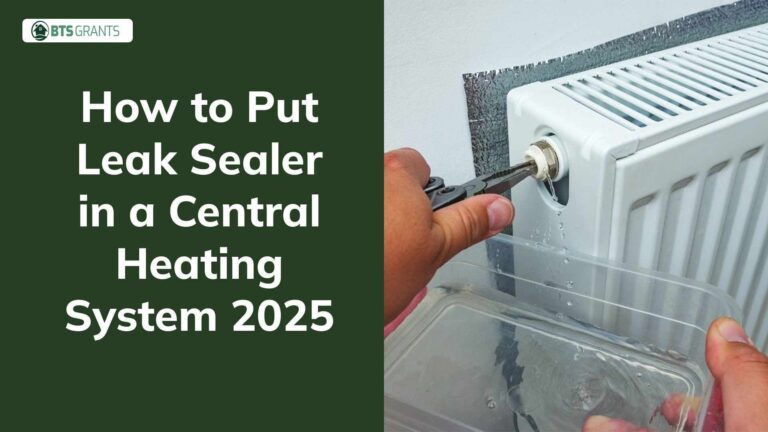![]()

With a growing increase in energy prices, many homeowners want to know how to cut down their heating costs. One of the largest areas of energy expenditure is central heating because it’s so necessary for home comfort during the cold months. Grants for central heating provide another positive step, offering an opportunity to upgrade to more cost- and energy-saving systems that consume less.
Grants provide invaluable assistance to senior citizens, older home dwellers and low-income families. They help keep homes warm and energy efficient by financing installation, upgrade or replacement of central heating systems. This guide looks at the different types of central heating grants, their benefits, and the application process.
Central Heating Grants for Over 60s
Specialized programs cater to the over 60s population. Grants frequently pay for a new heating system, or an outdated boiler is replaced. Installation charges and materials necessary for the work are also available.
For seniors, maintaining warmth is not always easy, particularly in older houses that do not have modern insulation. Central heating grants for the elderly help with the problem of maintaining warmth and efficiency in homes.
Eligibility Criteria:
- One of the eligibility requirements is getting a pension or other qualifying benefits.
- Older or inefficient heating system within the dwelling.
- Health issues that require maintaining a warm indoor environment.
Are There Any Grants For Central Heating Boilers For Pensioners?
Yes! If you are a pensioner with an old, inefficient boiler, there are grants for central heating boilers for pensioners. Old boilers pose a huge economic burden on the elderly because, more often than not, old boilers are ineffective and costly to operate. Several central heating grants for pensioners can easily solve this problem. Reducing the boiler replacement grant expense in replacing these old boilers with more energy-friendly versions helps mitigate this problem.
Such programs ensure that homes remain reliably warm during winter and at the same time, cut drastically energy cost. The eligibility requirements are usually based on pensioner status or income level as well as residence in homes with antiquated systems.
Oil Central Heating Grants
Some incentives do exist to install replacement oil boilers, or boost the efficiency of existing systems in rural homes, or locations with predominantly oil-heated homes. Reducing upfront upgrade costs to an oil boiler may lead to future energy cost savings through such incentive funds.
Those that are likely to benefit include:
- Poor households.
- Homeowners whose homes rely on heating oil simply because of infrastructure or geographical constraints.
Households can reduce fuel use and improve performance by switching to an energy-efficient system.
Central Heating Grants for Disabled Individuals
Maintaining a warm house is essential to the mobility and health of disabled people, but it is not just about feeling comfortable. Central heating grants help disabled people by offering them financial aid for installing or upgrading heating systems.
Other benefits include:
- Installation of thermostats available to people having visual or motility impairments.
- Schemes for amendments to make it easier to work with heating system.
All these incentives cause a tremendous improvement in the quality of life of handicapped people and their families.
Government Schemes That Offer Funding for Central Heating
Several government schemes offer funding for upgrading central heating. Some of the key objectives of such schemes include the reduction of energy poverty, reducing carbon emissions, and encouraging efficiency in energy consumption.
1. UK’s ECO4 Scheme
This energy company obligation program seeks to aid low-income homes become more energy efficient by offering subsidized heating upgrades such as smart thermostat controls, insulation upgrades and efficient boilers. Energy providers must pay for such improvements through subsidies offered under this program.
For eligibility, there are three basic qualifications.
- Those people who receive qualified benefits such as Pension Guarantee Credit or Universal Credit.
- Households with outdated or inefficient heating systems.
- People with low-income households.
2. The Warm Home Discount Scheme
The government established a scheme known as the Warm Home Discount to help low-income families with their heating costs and other energy bills. This scheme allows eligible homes to save directly on their energy bill.
The eligibility criteria involve:
- Those who receive specific benefits, including Universal Credit or Pension Credit.
- Families with young children or elderly members may also be eligible.
Although the primary aim of this scheme is to reduce energy costs, poor families who have high heating costs will greatly benefit from this.
3. Cold Weather Payments
Cold Weather Payments help the poor households with higher heating bills during extreme cold weather conditions. The payment is made automatically whenever the temperature is expected to remain below a certain threshold for seven consecutive days.
The following are eligibility criteria:
- Receiving qualifying benefits including Universal Credit, Income Support, or Pension Credit.
This scheme is designed to provide financial assistance to households facing exceptionally severe winter weather.
4. Council Grants and Scheme
Many of local councils across UK provide funding supports or their self-heating scheme grants for different residents to have heating requirements and needs addressed through the authorities that are close to them. Generally speaking, this help is granted via a local council that aims to reduce cost on a daily basis with upgrades in a case of central heating or other kind.
The process typically varies from one authority’s criteria to its funding offer. Some councils may also offer support for central heating repairs or provide assistance in replacing broken or inefficient heating systems.
How to Get Grants for Heating
If you follow the following procedure, you will enhance your chances of getting financial help.
1. Evaluate Your Eligibility:
Ensure that you are eligible for the program you want to apply for. Typically, it depends on age, income level, and the condition of the heating system.
2. Analyze Available Programs:
Search for grants according to your needs. Some of the best resources include non-profit organizations, local authorities, and official government websites.
3. Assemble the required forms:
Prepare your ID, utility bill, and other proofs of income. Depending on the program you’re applying to, you could be asked for details about any current heating sources you have installed.
4. Fill the Application Form:
Complete all fields within the application completely. Errors can lead to rejected or delayed application.
5. Submit your application:
Send the completed application form in person or online, depending on the program’s requirements. Always keep a photocopy of the application for further use.
6. Follow-up:
Contact the program office for the status of your application, if you have not received a response from them within the anticipated time.
Benefits of Grants for Central Heating
Heating grants are an excellent source for eligible households since they offer numerous benefits.
1.Lower Energy Bills:
Monthly heating bills are lowered by energy-saving technologies. Even greater energy usage is optimized, thus generating substantial savings through smart controls.
2. Enhanced Comfort:
The new systems provide constant warmth, less noise, and better-quality air, which means increased comfort.
3. Health and Safety:
The improved systems decrease the cases of respiratory problems by creating healthy indoor air quality and removing dangers like carbon monoxide leaks.
4. Environmental Impact:
Through lowered carbon emissions, energy-saving appliances help ensure a safe future for everyone.
5. Support to Vulnerable Groups:
To obtain equal access to warmth, grants favor those low-income families, seniors, or persons with disabilities.
6. Long-term saving:
These enhancements will eventually become less expensive because they have fewer requirements for maintenance and also less cost of energy.
7. Greater value of the property:
Homebuyers tend to prefer houses that have an energy-efficient heating system.
Conclusion:
Central heating grants can benefit UK homeowners with high energy bills. Programs such as ECO4, Warm Home Discount, and Cold Weather Payments offer financial assistance for heating system upgrades. Benefit from warmer homes, lower energy costs, and reduced environmental impact by determining your eligibility and applying for the appropriate award. It will take just minutes!
https://medium.com/@btsgrantsuk/first-time-central-heating-grants-apply-now-at-zero-cost-e081c0cf8457
https://medium.com/@btsgrantsuk/how-to-apply-for-the-free-boiler-scheme-birmingham-in-2024-3526d63898c4
https://sites.google.com/view/bts-grants-uk/blogs/how-to-drain-central-heating-system-without-stress
The amount varies for each program. A few types of incentives provide partial money or reimbursement, while others cover the entire cost for a new installation or the full cost of repair.
It all depends on the program. Usually, processing an application could take weeks or even months.
Yes, most programs do favour low-income families. Disabilities and the aged are often preferred.
That depends on the program you are participating in. Some grants only permit one assistance category at any time.
Yes, some grants provide funds to restore items if broken down beyond repair, while some may assist in emergencies.








